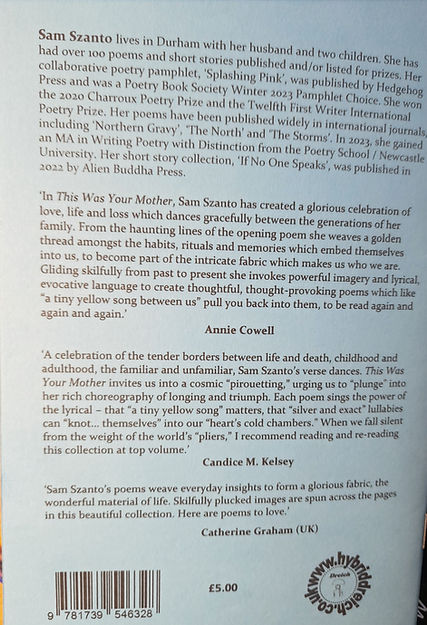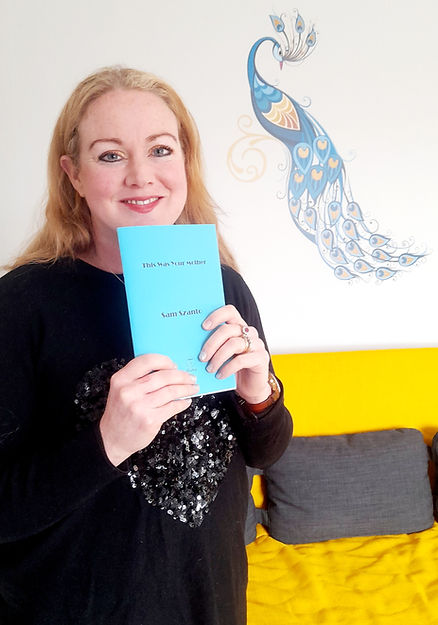François Bereaud: 'Prompts for some of the stories in this collection include a certain flag, a smashed car, two semis parked on an overpass, a newspaper article about elephants'
- samszanto2
- Jul 6, 2024
- 4 min read

A chat with François Bereaud about his short story collection, San Diego Stories (Cowboy Jamboree Press, 2024)
How would you describe San Diego Stories in one sentence?
Through the lives of various characters including a hockey player frustrated by infertility, a bisexual professor who picks up a stripper late at night, and an unemployed crown moulding specialist who’s suffered a bicycle crash and rattlesnake bite, we see San Diego as a real city, full of struggles, heartbreaks, and small successes.
(Kind of a long sentence I know! :)
Why San Diego?
Most simply because I live here. It’s also the place where, after thinking about writing for years, I finally made a commitment to do it, starting with getting an MFA in fiction from San Diego State University. Finally, while the city has extraordinary writers, I feel that it’s underappreciated as a literary landscape relative to other American cities and locales.
I wondered if you were at all inspired in the creation of the collection by writers like Maupin? Tales of the City, for example?
I’ve haven’t read that collection. I didn’t set out to write this collection. It happened far more organically. I had a group of stories I liked, some published, others not, which had San Diego as a common thread. I love linked story collections and thought this could be the unifier for me. The last stories I wrote for the collection had more intentionality in showing parts of the city culminating in the novella which takes the readers in detail through several of my city’s neighbourhoods.

I once did an American Literature module, possibly also called ‘Tales of the City’, about writers who prominently feature cities in their work – Maupin for San Francisco, as well as Amy Tan from a different perspective, Auster for New York, Anne Tyler for Baltimore and many others. I wonder if you think this is a particularly American thing to do, this emphasis on cities almost appearing as protagonists in the text? And if so, why?
This is a tough question which I don’t feel qualified to answer though clearly cities provide a panorama for authors. And of course, this isn’t new – thinking of Dickens, Orwell, Whitehead. Whether or not this phenomenon is particular to American writers, I’m not sure.
Are there are any other cities you’d be interested in writing about?
I think I’d have to live there for some chunk of time so that’s a big limiting factor. I love Philadelphia – my grandparents spent their whole lives there and my mom is there now - but I only lived there one year so I don’t think I have enough of the feel. I grew up and worked in Ithaca, NY, somewhere between a small town and a city. I could set a collection there.
How long did the book take to write?
This one is tough as I didn’t set out to write it per se. The first story I wrote was “Borders” (which is also the first chapter of an unpublished novel with the same title) in 2014 or 15. The latest stories in the collection were written in 2023 so there’s a span of nine years there.
How did you structure the collection?
It was mostly done by intuitive feel. The collection opens with two stories which are very closely tied to the city. The couple that follow are less connected and then I pull the reader back to San Diego. The lengths of the stories vary from 500 words to 11K (the collection ends with a 32K novella) and I intentionally mixed those which I hope makes for a fun reading experience.
How did you choose a publisher?
My most ever rejected story (35 times), “The Flag”, was published by Cowboy Jamboree Press in fall 2022. I read other stories put out by them as well as several of their books (collections by Amanda Bales, Meg Tuite, and Sheldon Lee Compton). I loved what I read as well as the look of the books. Sadly, I’ve read a few indie published books where the book quality simply didn’t live up to the writing. I reached out to Adam Van Winkle, CJ’s amazing publisher, sent the manuscript, and the magic happened. Adam has been a joy with work with and has allowed me to design much of the book including the cover and original photography which will appear before each story for which I’m overjoyed and grateful.
What has been the reaction to the collection? Have there been any individual reactions that have surprised you?
The published stories have been well received. I’d love to grow my readership but I know there are stories in the collection which have moved people. I have a blurb from a writer I greatly respect which made me tear up.
Who or what inspires your writing?
On a macro level, both reading great literature (much of it indie at this point) and the desire to get my ideas on paper and then possibly into the world. On a micro level, images or tidbits often inspire particular stories. Prompts for some of the stories in this collection include a certain flag, a smashed car, two semis parked on an overpass, a newspaper article about elephants, and a video of me reading at the public library.
Which author (dead or alive) is your fantasy book-blurber? What do you think they would say about San Diego Stories?
Tough one but I’ll go with Danielle Evans whose collection, The Office of Historical Corrections, is my favourite of this decade (any decade?). No idea what she’d say, but I’d be happy with, “These stories don’t suck, read ‘em.”
Do you have a favourite story in the collection and if so, why?
That’s a bit like choosing a favourite child but I’ll go with “Snakebit”. It has a fairly incredible “story behind the story” which I won’t share here, but will share at my readings.
As well as being a writer, you’re also a superstar editor. I wonder how doing that has affected your writing and vice versa?
Superstar is overstated, but thank you. On one hand editing definitely gives me less time to write, but, on the other, it has made me appreciate literature even more. Particularly from folks who have day jobs, families, and a slew of other commitments which make this indie lit “business” so tough. Just a few years ago, I had zero idea of how much great writing lies below the surface of commercial prominence. It inspires me to contribute my tiny part.







Comments